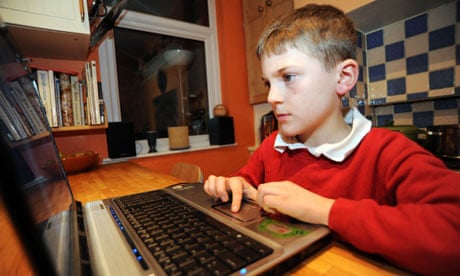A million children's exam results will be on average a grade lower than their peers this year because they do not have internet access at home, according to a leading charity.
The e-Learning Foundation says that children without access to a computer in the evening are being increasingly disadvantaged in the classroom. Research suggests that 1.2 million teenagers log on to revision pages every week and those using online resources were on average likely to attain a grade higher in exams.
The charity cites BBC research in which more than 100 students used the BBC Bitesize revision materials before their GCSE examination. The children were found to have achieved a grade lift compared to those who did not use the online revision guides. The BBC study says: "This is compared to factors such as teacher influence, which was found to produce no significant difference."
However, experts claim the Department for Education is now neglecting its duty to increase computer ownership among the most disadvantaged. The coalition government cut the Home Access scheme set up by Labour three years ago, which helped low-income families to buy a laptop computer.
And the British Educational Communications and Technology Agency, which had responsibility for encouraging the use of technology in learning, was abolished in the Conservative-led government's so-called "bonfire of the quangos" earlier this year.
Meanwhile a study by Besa, the trade association for the educational supply industry, revealed that, due to budgetary pressures, schools plan to spend around 8% less on the provision of computers to pupils this year. Critics claim this will negatively affect after-school IT sessions, vital to those without the internet at home.
Only 60% of the 246 primary schools and 188 secondary schools surveyed said they were able to maintain their current spending. Yet nearly a third of schools will make extensive use of home access to the curriculum through the internet.
The e-Learning Foundation said it feared the gap between rich and poor pupils' performance would widen unless more was done to ensure that every child can use a computer at home. The charity's previous studies show the poorest families were two-and-a-half times less likely to have an internet connection at home than the richest ones.
Valerie Thompson, chief executive of the e-Learning Foundation, said: "Without home access to the internet many pupils struggle to complete their homework and coursework and, at this time of year, miss out on the benefits of online revision sites. The digital divide is having a truly damaging impact on children's prospects and causing the most disadvantaged to fall further behind.
"We know that online revision sites can help young people to get the best possible results. But we have to tackle the digital divide so that all young people can benefit from the opportunities that online learning has to offer."
Young people's access to the internet at home and in school has been growing in recent years and even seven years ago the UK Children Go Online study, which investigated 9 to 19-year-olds' uses of the internet, found that most children use it daily or weekly. The study also found that, among the daily or weekly users, 90% of the children surveyed use the internet for homework.
The e-Learning Foundation claims that access has still not been broadened to the poorest households and that this had a significant impact on levels of attainment during exams.
Last night the former Labour schools minister, Lord Knight, said the government appeared to be losing the battle to bridge the "digital divide". He said: "We had a scheme where people on tax credits could apply for a pre-charged visa card which could be used in a number of high street stores to buy a laptop. As a result 500,000 low-income families buy a computer. It delivered for a lot of kids and the government is continuing to fund it for children with special educational needs but not for everyone.
"People may think it is a luxury and times are hard, but the times are changing and the next generation need to know how to use the latest technology."

Comments (…)
Sign in or create your Guardian account to join the discussion